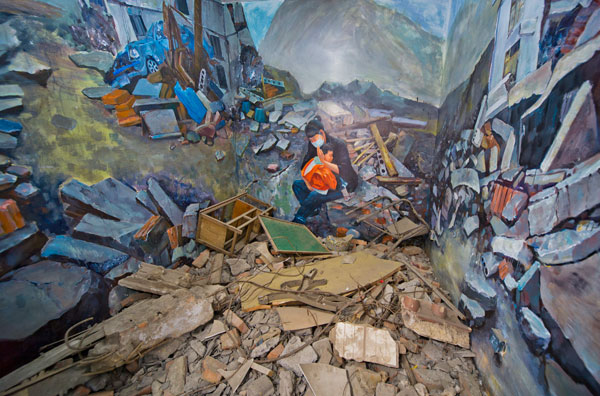
 'Taken 2' grabs movie box office crown
'Taken 2' grabs movie box office crown
 Rihanna's 'Diamonds' tops UK pop chart
Rihanna's 'Diamonds' tops UK pop chart
 Fans get look at vintage Rolling Stones
Fans get look at vintage Rolling Stones
 Celebrities attend Power of Women event
Celebrities attend Power of Women event
 Ang Lee breaks 'every rule' to make unlikely new Life of Pi film
Ang Lee breaks 'every rule' to make unlikely new Life of Pi film
 Rihanna almost thrown out of nightclub
Rihanna almost thrown out of nightclub
 'Dark Knight' wins weekend box office
'Dark Knight' wins weekend box office
 'Total Recall' stars gather in Beverly Hills
'Total Recall' stars gather in Beverly Hills
Museum mason
Updated: 2013-05-20 00:45
By Erik Nilsson and Huang Zhiling (China Daily)
|
||||||||
 |
|
Paintings and rubble from the Wenchuan earthquake are displayed. Provided to China Daily |
Instead of becoming a drum, Fan will donate his organs for research. His ashes will be buried beneath a tree outside his office, which - along with his library - will be perfectly preserved as a wing of the museum.
"The cigarette butts should be left in the ashtrays, and even the toilet paper shouldn't be flushed," he explains.
While many say Fan is eccentric - he also nicknamed his son "Double-cooked Pork" and pens profane calligraphy - nobody argues with his success.
He built his repository empire after stints as a farmer, soldier, university instructor, entrepreneur, medical doctor and deputy mayor of Sichuan's Yibin city - the job he quit to found his museum.
He hardly looks the part of tycoon, clad in mismatched camouflage pants and a jacket.
Fan shocked many by declaring he'll donate his museum outside Sichuan province's capital Chengdu to the central government when he dies.
"Even my daughter will have to pay admission," he says.
He explains he doesn't want his family to fight over the inheritance, and China's only historical sites that survived millennia were State properties.
"Wuhouci temple has lasted 1,780 years, Dufu's Thatched Cottage has endured more than a millennium and Dujiangyan's irrigation system stands 2,500 years later because they remained under government control," Fan says.
The museum has 22 halls and will add three this year. Fan hopes to open 30 to house his 8 million relics. About 3 million are under first-class national protection, he says."The 30 halls represent 30 years of opening-up and reform," Fan says.
"I was personally involved in, and benefited from, the policy."
While 30 halls are his hope, 100 are his "dream", he says.
"I want to do something unprecedented in China," Fan says.
"I hope God gives me another decade to do this. I was born to build museums."
His is the country's only repository with halls dedicated to the "cultural revolution" (1966-76) and Kuomintang.
His other buildings are devoted to such historical happenings as the Flying Tigers, the War of Resistance against Japanese Aggression (1937-45) and the 2008 Wenchuan earthquake.
Fan points out that, despite its extensive history, China ranks lowly in museums per-capita.
But they're critical to civilizations, he believes.
Most Viewed
Editor's Picks

|

|

|

|

|

|
Today's Top News
Shenzhou X astronaut gives lecture today
US told to reassess duties on Chinese paper
Chinese seek greater share of satellite market
Russia rejects Obama's nuke cut proposal
US immigration bill sees Senate breakthrough
Brazilian cities revoke fare hikes
Moody's warns on China's local govt debt
Air quality in major cities drops in May
US Weekly

|

|







